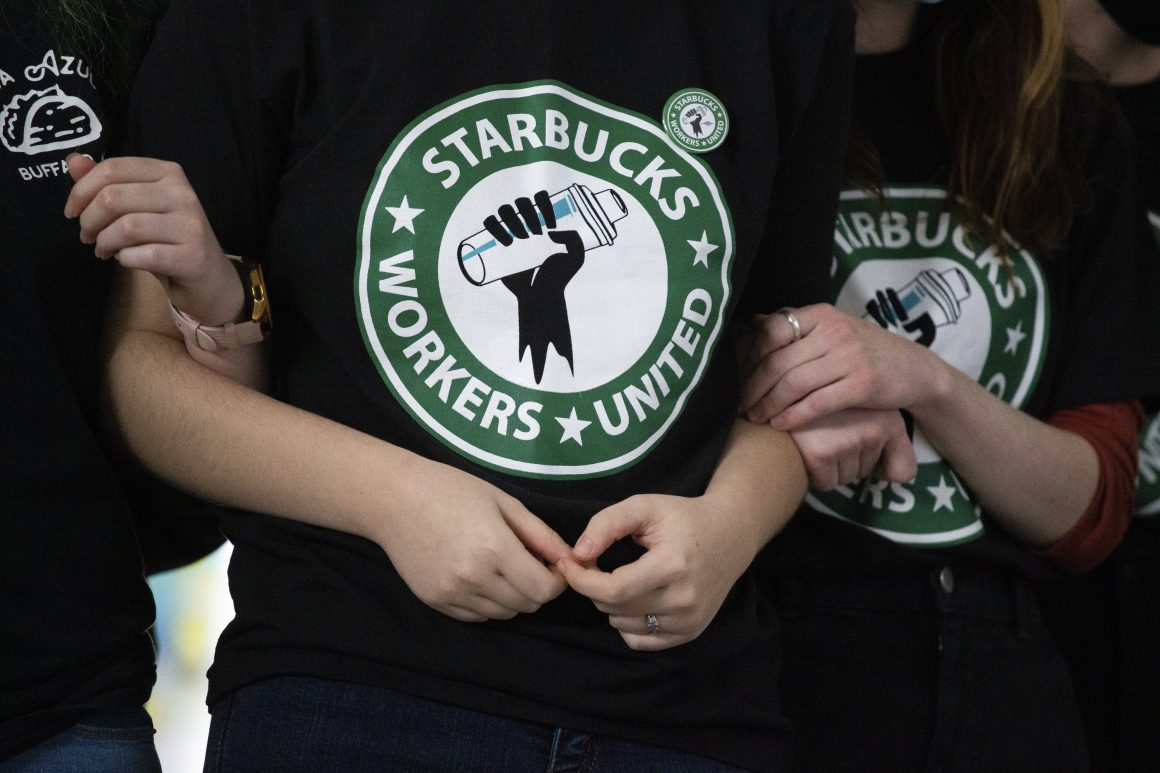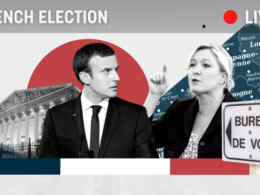This article by Seattle City Councilmember Kshama Sawant was originally published with Jacobin.
Starbucks workers in Buffalo, New York, voted in December to become the first recognized union at the coffee giant in the country. Inspired by the victory, workers have launched a national wave of organizing at Starbucks and other coffee chains. Organizing drives have since been announced at more than fifty-five Starbucks locations.
The union push has also spread to Seattle, home to Starbucks’s headquarters and billionaire former CEO Howard Schultz, and also where I serve on the city council as its only elected socialist. As a member of Socialist Alternative and Democratic Socialists of America (DSA), my council office stands unequivocally with coffee workers, and we are ready to do whatever we can to support them.
This organizing drive can be a crucial step in rebuilding a fighting labor movement in the United States. It comes in the wake of last fall’s powerful “Striketober” actions, as over a hundred thousand workers went on strike amid this historic crisis of capitalism, marked by low wages, unsafe conditions, and the worst inflation in four decades.
The COVID-19 pandemic has put the health of millions of frontline workers at risk. While they have been praised as “heroes,” it is wealthy corporate bosses, not the workers, who have reaped the benefits of their labor. In real terms, after factoring in inflation, workers in the United States took a 2.4 percent wage cut in 2021. Meanwhile, corporate profits have skyrocketed: profits in 2021 were 34 percent higher compared to pre-pandemic levels, and billionaires added $5 trillion to their wealth last year alone.
Workers are recognizing that they are getting fleeced under this system and are beginning to fight back.
Union-busting efforts
Despite its trademark progressive rhetoric, Starbucks management is doing everything it can to crush the new union in its midst, Starbucks Workers United. This includes threatening workers, closing down stores temporarily, and sending an army of 100 managers to Buffalo, including Schultz and top Starbucks executive Rossann Williams.
The bosses are talking out of both sides of their mouths, as usual. Starbucks executives promise publicly they “will bargain in good faith with the union” while simultaneously threatening workers and forcing them to attend required anti-union propaganda meetings at their workplaces. They say, “We’re not anti-union, we’re just pro-partner.” (Starbucks likes to call its workers “partners” while denying them decent wages and paying their CEO, Kevin Johnson, a cool sum of $20 million a year.)
If Starbucks executives really wanted to show “good faith,” they would halt their intimidation efforts and anti-union propaganda and immediately recognize the union at all the stores that have submitted union card majorities. This would mean accepting the basic labor right of “card check neutrality,” which Starbucks executives have refused to do.
That is why I have introduced a Seattle City Council resolution in support of Starbucks workers demanding exactly this. Along with Starbucks workers from Buffalo and Seattle, I held a press conference last week urging the Seattle City Council to pass the resolution immediately without watering it down.
I urge progressive and socialist city councilmembers, state legislators, and congressmembers across the country to follow suit. Already, fellow socialists and DSA members Chicago alderman Byron Sigcho-Lopez and Minneapolis city councilmember Robin Wonsley Worlobah have announced they are bringing similar resolutions in their cities. I hope other DSA elected officials will do the same nationally.
Lessons from labor history
Starbucks is going all out to defeat workers in every store because the bosses know that each individual victory can help the union spread and will give confidence to the whole working class. But while these unionization efforts have enormous catalytic potential, victory is far from certain. Coffee workers will need to rely on a class-struggle approach to win. This is one of the key lessons from the past victories and defeats of the workers’ movement.
A class-struggle approach means taking seriously the old labor adage that power in the bargaining room comes from power outside. We don’t win through moral persuasion or making clever arguments to the bosses and their corporate lawyers, but by the strength of our organizing in the workplace and in the streets.
Nothing demonstrates this principle more clearly than what the recently unionized Buffalo Starbucks workers at the Elmwood store have just accomplished. Only weeks after winning their union, they went on a five-day strike and forced the company to concede on a major demand — to give workers paid time for quarantine and self-isolation if they are exposed to COVID. They won this not just for themselves, but company-wide. This is a massive victory that will benefit their fellow workers in every one of the nine thousand company-owned Starbucks stores. And it only happened because workers exercised their power to strike.
This victory also demonstrates another key lesson: our greatest power comes from withholding our labor, because nothing moves under this system without workers, and shutting down production halts the bosses’ profits.
The last several decades have seen a massive decline in the labor movement as a majority of labor leaders have rejected class-struggle methods, instead adopting a “business unionism” approach.” Business unionism means that workers should quietly let labor leaders negotiate mutually agreeable contracts with the bosses, rather than actively organizing themselves and fighting for their collective interests. The problem is that the bosses will never concede unless they are forced to by an active struggle of workers — because every dollar spent on workers’ wages, benefits, and workplace safety is one dollar less in profits. The result of this disastrous approach by many union leaders has been nearly half a century of defeats for workers. Union density in the private sector is now at just 6 percent.
To rebuild a fighting labor movement, we need to return to the traditions of class struggle and socialist ideas on which the labor movement was built.
Past labor struggles show that we are strongest when we stand together. Starbucks workers in each store cannot take on the company alone. They will need to organize on a regional and national basis, while appealing for solidarity from unions and the wider working class.
That’s why we are proposing that Starbucks workers organize a national day of action to help spread the movement. A national campaign can help build the momentum of the struggle and can bring coffee workers’ demands onto the national stage, putting pressure on the company and convincing others to join the struggle.
As a representative of Seattle’s working class, I accept only the average worker’s wage and donate the rest of my six-figure salary into this solidarity fund for crucial struggles. Our office and my organization, Socialist Alternative, will do everything we can to help workers win. Toward this end, I am donating $10,000 from my solidarity fund to Starbucks Workers United.
“Power concedes nothing without a demand”
There is some debate among Starbucks workers about whether demands are needed during union drives or only after the union is won. This is a crucial strategic question, and the more open discussion and debate that is had around it within the movement the better. In my experience, it is important to develop strong demands early that can unify and inspire workers to fight for common concrete goals.
Clear demands are also crucial to push back against anti-union propaganda. The bosses will say that a union may sound good in the abstract but in practice “they just want your dues money” and “they don’t really do anything.” If the best defense is a good offense, then the best way to defend against Starbucks’s union-busting is by clearly explaining both why a union is needed and what exactly it will fight for.
I would never have become the first socialist elected in Seattle in nearly a century had I not made it crystal clear I would go all out to pass a $15 minimum wage, a demand that at the time was dismissed as utopian by corporate politicians (and, unfortunately, even many union leaders). Within six months after taking office in 2014, we delivered. I would never have defeated the right-wing recall campaign against me last year had I not followed through on my promise to help win the historic Amazon Tax for affordable housing. Working people were committed to these fights because they were invested in winning these concrete demands that could make a real difference in their lives.
Wages are a key demand for Starbucks workers to discuss. Starbucks is saying this summer it will finally raise the hourly wage at its stores to a minimum of $15. But nearly a decade after the Fight for $15 movement began, $15 an hour is far from enough to live on anywhere in the United States, especially in light of massive inflation and sky-high housing costs.
Should Starbucks workers call for $20 an hour minimum before tips at all stores nationwide? Winning such a demand will require a serious organizing effort during the contract fight, but if paired with the unionization effort, it could help to mobilize and inspire workers to be active participants in this all-out fight. From my discussions with Starbucks and other coffee shop workers, it seems that calling explicitly for good mental health and gender-affirming care for all workers, not just those who are full-time, is also a crucial demand that can win more workers to the union and cut through management’s union-busting lies.
These early victories by Starbucks workers are a powerful example of what’s possible, but the struggle has just begun. After forming a union, the fight for the first contract can sometimes be as hard or harder than the initial union vote. Starbucks and other coffee workers will need to remain strategic and focused in order to take advantage of this exciting moment.
By building on their victories and taking a class-struggle approach, they have an opportunity to show the way forward for all working people. It is an honor to support them in their fight.












